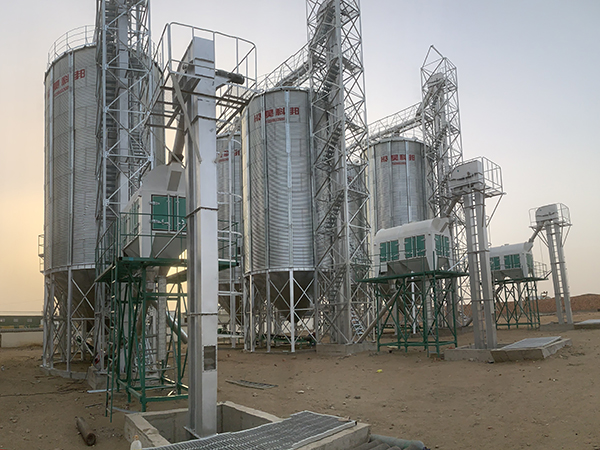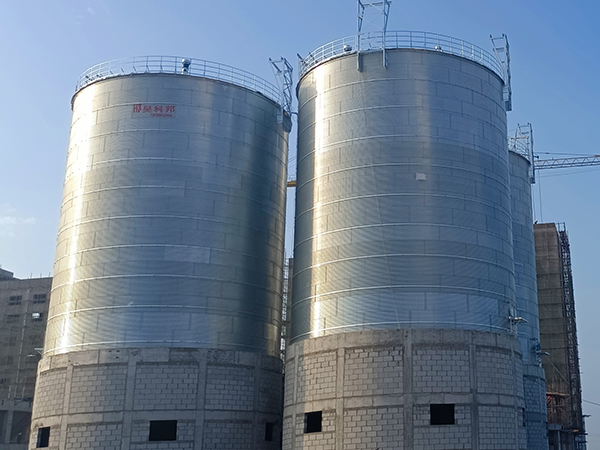Feed silo factory in Libya,Africa
Feed silo factories are vital in modern animal husbandry, focusing on designing, manufacturing, and supplying high-quality feed silos with considerations for structural design, material selection, ventilation, and quality control. The production process involves precision machining, automated lines, and strict quality inspections, ensuring reliable and efficient feed storage solutions.
- Main Advantages of Wheat Silo in Uganda
- Main Functions of Wheat Silo in Uganda
- Corn mill factory in Mali
- Maintenance Methods for Wheat Silo in Uganda
- Maintenance Methods for a Rice Silo in Uganda
- Wheat mill supplier in Malawi
- Installation Process of a Rice Silo in Uganda
- Structural Composition of a Rice Silo in Uganda
- Flour mill sale in Rwanda
- Main Advantages of Rice Silo in Uganda
- Primary Functions of Rice Silo in Uganda
- Grinding mill cost in Libya
In the rapid development of modern animal husbandry, the effective storage and management of feed have become key to improving production efficiency and ensuring food safety. The feed silo factory, as a provider of professional storage solutions, plays a crucial role in designing, manufacturing, and supplying high-quality feed silos.
Design Elements of Feed Silos
The design of feed silos is the cornerstone of ensuring their functionality, economy, and safety.


Structural and Capacity Design
The structural design of feed silos should consider various factors, including feed type, storage capacity, and material extraction methods. Vertical silos are suitable for vertical extraction, while horizontal silos facilitate horizontal conveyance. Capacity design should be based on the farm’s feed production and consumption to avoid over-investment or insufficient storage space.
Space Optimization: The design should consider the rational location of the silo in the farm layout, maximizing space utilization.
Extraction Efficiency: The design of the material handling system should ensure fast and even extraction, reducing feed waste.
Material Selection and Anti-corrosion
Treatment Material selection directly affects the durability and maintenance cost of the silo. Stainless steel and galvanized steel sheets are widely used in silo manufacturing due to their corrosion resistance and durability.
Stainless Steel: Suitable for humid or corrosive environments, offering a longer service life.
Galvanized Steel Sheet: Provides an additional anti-corrosion layer, economical and practical for most applications.
Ventilation and Temperature-Humidity Control
Proper ventilation and temperature-humidity control are crucial for preventing feed mold and maintaining nutritional value.
Ventilation System: Design reasonable ventilation paths to ensure air circulation, reducing condensation and moisture accumulation.
Temperature-Humidity Monitoring: Install sensors to monitor the internal environment of the silo, adjusting ventilation and heating equipment in a timely manner.
The Production Process of Feed Silos
The process of manufacturing feed silo in the factory covers multiple stages, from raw material processing to finished product assembly.
Precision Machining Technology
Precision machining technology ensures the precise fit of silo components and structural stability.
Laser Cutting: Improves cutting accuracy and reduces material waste.
CNC Bending: Ensures consistency in bending angles and shapes, enhancing assembly efficiency.
Automated Production Line
The application of an automated production line greatly increases production efficiency and product quality.
Consistency: Automated equipment ensures that each silo is manufactured to the same standard.
Efficiency: Reduces manual operation, shortens production cycles, and speeds up order delivery.
Quality Inspection and Monitoring
During the production process, each step must undergo strict quality inspection and monitoring.
Raw Material Testing: Ensures all raw materials meet manufacturing standards.
Process Monitoring: Monitors the production process in real-time, identifying and resolving issues promptly.
Finished Product Testing: Conducts comprehensive testing on completed silos to ensure performance meets standards.
Quality Control and Certification of Feed Silos
Quality control is key for feed silo factory to win customer trust and market recognition.
Quality Management System
Factories should implement a comprehensive quality management system, such as ISO 9001, to ensure high standards for products and services.
Process Standardization: Establishes strict production processes and operating standards.
Continuous Improvement: Constantly optimizes production processes and product quality based on quality feedback.


Product Testing and Certification
Feed silos must undergo a series of product tests and certifications before leaving the factory.
Load Testing: Verifies the stability of the silo structure under full load conditions.
Sealing Test: Ensures the silo is leak-free, preventing feed from becoming damp.
Customer Feedback and Continuous Improvement
Factories should establish an effective customer feedback mechanism to keep abreast of customer needs and market changes.
Feedback Collection: Regularly collects customer usage feedback to identify issues and points for improvement.
Product Iteration: Continuously updates product design based on market feedback and technological advancements.







